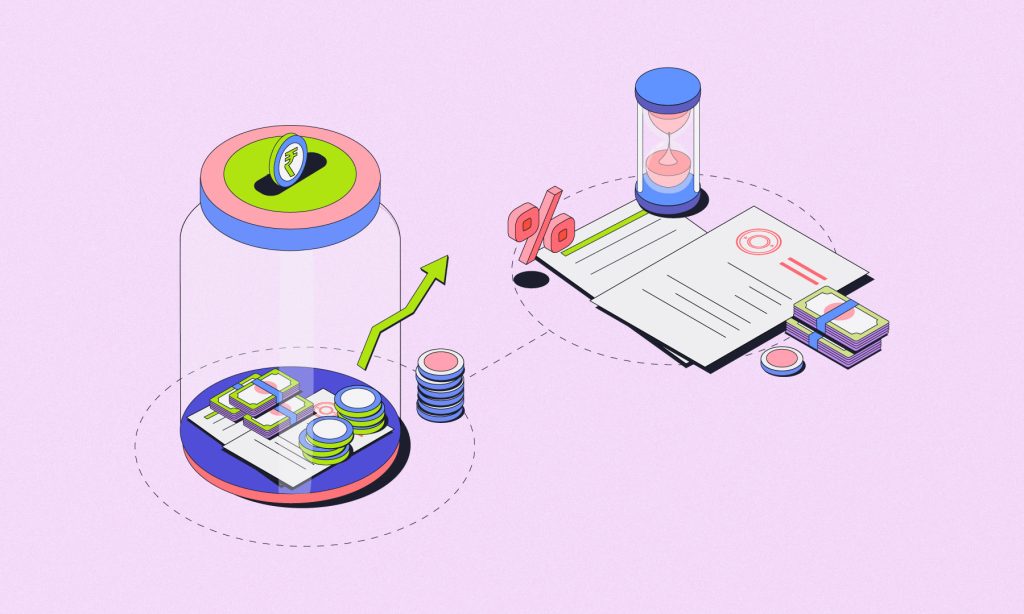You will be astonished to know how many people still save their spare cash in a piggy bank or safe. But with piggy banks and safes, there is always the risk of theft, accidental loss, and even accounting errors. Besides, saving in these ways does not earn you any interest. The same amount in a fixed deposit could grow significantly in even one year. And what if we told you there is something as safe as a fixed deposit and as simple as a piggy bank but more rewarding than FDs? That’s Certificates of Deposit (CDs). Learn more about them and how FDs are different from CDs.
What are Fixed Deposits (FDs)?
As the name indicates, a fixed deposit is nothing but an account for storing a fixed sum for a fixed tenure. A fixed deposit gives the depositor a significantly higher interest rate than a saving account. The period may vary from a week to 5 years.
The first deposit scheme in India instituted by a bank was by the State Bank of India in 1951. Back then, one could start a fixed deposit with a nominal deposit amount of ₹100.
What are Certificates of Deposit (CDs)?
Certificates of Deposit (CDs) are a type of time deposit, like an FD. And they, too, are backed by banks and offer a fixed interest rate. So they are promissory notes guaranteeing the holder a fixed amount at the end of tenure. However, unlike FDs, the minimum investment amount for CDs is Rs1 lakh. And the rate of interest that financial institutions offer on CDs is significantly higher than on FDs. CDs also come with shorter tenures ranging from 0–1 year.
In India, all scheduled commercial and nationalized banks can offer a certificate of deposit.
Until 2021, there was confusion about whether Regional Rural Banks could offer a CD; however, in 2021, the Reserve Bank of India announced they could.
The differences between CDs and FDs
There are mainly four crucial differences between CDs and FDs.
Minimum investment amount
The minimum investment amount for CDs and FDs in India varies from bank to bank. Generally, the minimum investment amount for a CD is higher than for an FD. For example, the minimum investment amount for CDs is ₹1 lakh, while for FDs, it is ₹1,000.
Returns on investment
The returns on investment in FDs and CDs vary depending on the bank, the tenure, and the investment amount. Generally, the interest rates offered on CDs are higher than those offered on FDs for shorter tenures, while the interest rates offered on FDs are higher than those offered on CDs for longer tenures.
Investment horizon
Investment horizon refers to the period an investor invests in these deposits. The investment horizon for both can range from 0-1 year for CDs and 3-10 years for FDs.
Collateral for loan
CDs cannot work as collateral for loans, whereas FDs can.
Conclusion
Whether you invest in an FD or CD depends on your financial goals and investment needs. CDs may be the better option if an investor is looking for a short-term investment with higher interest rates. However, if an investor is looking for a long-term investment with decent interest rates, then FDs may work well. Investors should also evaluate the bank’s credibility or the institution they buy an FD or CD from.
FAQs
What is the difference between CDs and FDs?
Certificates of Deposit (CDs) and Fixed Deposits (FDs) both offer interest on savings. CDs are offered by banks for fixed terms with penalties for early withdrawal. FDs are similar, provided by banks and non-banking financial institutions, with fixed terms and predetermined interest rates. Both are low-risk investment options, but specific terms and features may vary.
How risky are certificate of deposits CDs?
Certificates of Deposit (CDs) are generally considered low-risk investments. They offer a fixed interest rate and are FDIC insured in the US up to $250,000 per depositor per bank. The main risk is that your money is locked in for a specific term, limiting access, and potential returns might be lower compared to riskier investments.
What is the main disadvantage of a certificate of deposit CD )?
The main disadvantage of a Certificate of Deposit (CD) is its lack of liquidity. Once you invest, your money is tied up for a fixed term. Withdrawing early often results in penalties, limiting your access to funds. This could be inconvenient in emergencies or when better investment opportunities arise.
What is FDs?
Fixed Deposits (FDs) are financial products offered by banks and financial institutions. They allow individuals to deposit a lump sum of money for a fixed period at a predetermined interest rate. FDs are considered safe investments, providing a guaranteed return at the end of the tenure. However, they typically have lower returns compared to riskier investment options.








